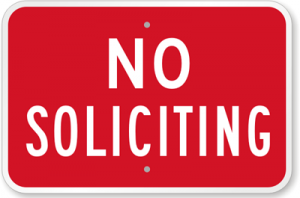Americans don’t lack for opportunities to donate to charities. We are continually solicited by telephone, email, social media, mail, and door-to-door.
In recent years, we have added checkout counters to that list. Now many retail transactions are concluded with “would you like to make a donation today to…?” It’s not unusual to get solicited like this half a dozen times a day, day after day.
I’m not a fan. It feels like the glaring checkout person is judging while customers are craning their necks to see what kind of sociopath would deny hope to the homeless puppies, cancer battlers or wounded warriors. And I’m that kind of sociopath.
Good Brand Management?
I understand why charities like this approach. It’s an opportunity to have third parties making their pitch to a captive audience who just happens to have it’s wallet wide open. It also doesn’t hurt that the prospective donors’ peers are watching. The checkout solicitations constitute free advertising and fundraising services delivered at a very opportune moment.
Nickels and dimes, you scoff? This approach raises a great deal of money — $358 million from 63 charities in 2012 – with the charities barely lifting a finger.
 I also understand why retailers like it. The theory is that associating a retail brand with a warm and fuzzy charity makes the retailer feel more warm and fuzzy by association. At first blush, it looks to be savvy brand management.
I also understand why retailers like it. The theory is that associating a retail brand with a warm and fuzzy charity makes the retailer feel more warm and fuzzy by association. At first blush, it looks to be savvy brand management.
But is it? While few openly complain, I have a feeling I’m not the only one grumpy about it. There is a reason why you see so many “No Solicitation” signs in front of stores. Because for many, being solicited is unpleasant and something we try to avoid.
Given how much retailers invest in optimizing the “customer experience “– the music, the lighting, the staff professionalism, the packaging, the flow of the store – it’s interesting how willing the same brand managers are to top off my customer experience with a big fat guilt trip that leaves me resenting them. And they wonder why I’m increasingly shopping online?
Five Reasons to Not Give To Checkout Charities
So I’m here to give you permission to say “no” to the homeless puppies. If others want to give at checkout, I applaud them. If that works for them, I’m all for it. But there are plenty of reasons – altruistic reasons even — to take a pass at the checkout counter, and donate on your own terms at another place and time.
Reason #1. To give yourself time to research and prioritize. Charities are not commodities. Some are better than others. Some fit your values better than others. Some are more efficient than others. Some produce better results than others. Maybe the charity soliciting at your favorite store is the best choice for you, but you won’t know until you take a little time to learn about them and others. Most of us wouldn’t dream of investing our savings without doing a bit of research, so why would we invest in charitable work without first doing a little research?
Reason #2. So you can nudge charities to get better. When we are doing impulse giving at checkout stands, charities don’t have much competitive pressure to improve their services. After all, why control your administrative costs and strive to get better results when your impulsive donors aren’t paying attention to those things. When donors are doing their research, asking probing questions, and voting with their feet based on what they learn, charities improve their services so they can earn more donations. And when charities improve their services, more people get helped.
Reason #3. So you can stick to your philanthropic budget. Just as many set a household spending budget, it’s a good idea to have a personal philanthropic budget. Let’s say your household budget says you can afford to donate $2,500 in a given year. When you’re haphazardly giving micro-donations at checkouts, it’s difficult to tell if you are over or under that budget at the end of the year.
Reason #4. So you can get the tax deduction owed to you. Okay, I don’t want to go all Section 170(c) of the Internal Revenue code on you, but you probably already know that charitable giving is tax deductible. However, it feels like almost no one tracks the $358 million per year in checkout donations. Not taking advantage of that deduction can mean the loss of a fair amount of money at tax time. That may strike you as awfully green eye shadey, but bypassing the charitable deduction is effectively throwing away money, money that you could choose to give charities.
Reason #5. So you can discourage a proliferation of checkout shakedowns. This much I promise you, the more we give at checkout, the more we will be solicited at checkout. Non-profits copy whatever works for other non-profits. So, if you don’t want to be continually solicited, you have to start declining.
Again, I’m not discouraging giving. Please keep giving. I’m just suggesting that it’s perfectly acceptable to deny the homeless puppies at the checkout counter and give on your own terms. As Shakespeare’s Hamlet said, sometimes you “must be cruel only to be kind.” If you ask me, the checkout counter shakedown is one of those times.
– Loveland
Note: This post was also published in MinnPost.

